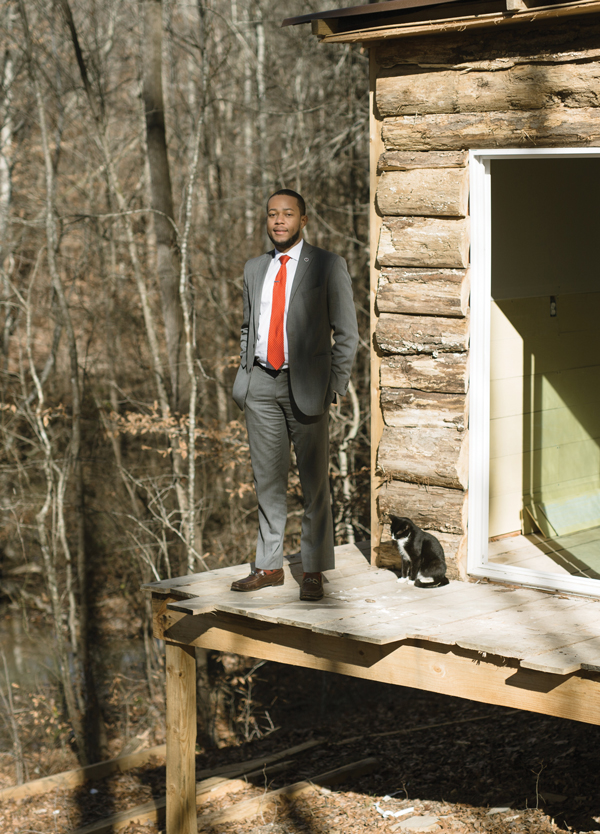
Ryan Shepard, 29
Like many people who start their own ventures, Ryan Shepard founded the Human Capital Theory (HCT) to address problems he had faced himself. Born to teenage parents in Los Angeles, he didn’t grow up with exposure to many career options. As a student at Morehouse, he struggled to start his own business. “I didn’t know how to manage cash flow or develop a steady revenue stream,” he says. And later, as a consultant at McKinsey and Company, he says, “I was learning from executives and meeting great people, but I didn’t have the opportunity to do anything meaningful in my own community because I was traveling so much.”
So Shepard, whose day job is administrator for the Atlanta Municipal Court, launched HCT in 2014 to connect local businesses and nonprofits with talent from underserved communities. HCT hosts meetups for people to share ideas on potential collaborations and partners with organizations such as Hillside Farms to extend mentorship programs that help young volunteers gain entrepreneurial skills. “It’s a way to give local businesses exposure to the talent pipeline that exists in their own communities,” he says.
Much of what Shepard is trying to do is inspired by his upbringing. His dad, stepdad, and grandfather all worked as cops, while his mother was a city inspector. “What are you doing for the community you’re a part of? This was constantly discussed in my family growing up,” Shepard says. “I feel energized when I’m doing work that provides a greater purpose to the community.”

Allie Bashuk, 28
Allie Bashuk was born and raised in Atlanta, but she never thought much of her hometown until she returned after graduating from the University of Georgia. “I came to love Atlanta the way a lot of young people do,” says Bashuk. “I realized, hey, there’s a lot of cool shit happening here.”
Since moving back in 2010, she’s been busy making cool shit happen: at Scoutmob, where she launched the company’s e-commerce hub, Shoppe; at General Assembly as the education company’s first Atlanta employee; and at the Goat Farm Arts Center, where she’s currently director of an initiative to foster collaboration between resident artists and the broader Atlanta community. “I do studio visits and help artists with whatever they might need, from writing a business plan to getting a 3-D printer for a show.”
Most recently, through the Goat Farm’s Beacons program, she’s been helping artists create studio spaces in vacant buildings in south downtown by negotiating below-market rents with property owners. Working to support artists has been a longtime passion of Bashuk’s; during a post-college stint in Athens, she founded an arts magazine called Young, Foxy & Free. “I love that with the Goat Farm, my work isn’t about me,” she says. “I enjoy being behind the scenes, supporting these artists who are making our city a better place to live.”
A 2015 Deloitte survey found that more than half of millennials would take a pay cut for a job that aligned with their values; 90 percent want to use their skills for good. Historically, the arts have never been lucrative, but that hasn’t mattered to Bashuk. “I’m focused on investing in experiences that will help me learn and open doors for me.” she says. “The money will come later.”

Rohit Malhotra, 29
By age 25, Rohit Malhotra had already worked for the White House and the Democratic National Committee and was working on his master’s degree in public policy at Harvard. “I was so inspired watching the private and public sectors come together to solve global issues, whether it was poverty relief or access to education,” he says.
But Malhotra wondered how social innovation could spur improvement on the local level. Specifically, he wondered how it could help Atlanta; as a metro native and Emory graduate, Malhotra saw untapped potential in his hometown. “I felt very moved by the passion of people who were doing incredible things to improve our city,” he says.
Malhotra founded the Center for Civic Innovation in 2013 to foster the kinds of big ideas that could change Atlanta for the better. Through events and workshops at its 7,500-square-foot space above Underground Atlanta, the organization brings together volunteers, public agencies, and private companies to identify great ideas, test them, and—if deemed promising—fund them.
One of CCI’s first initiatives raised $100,000 to address problems caused by food deserts. The program now works with a woman who helps low-income women in the West End overcome nutritional deficiencies during pregnancy.
“If she can help reduce the number of women in the late stages of their pregnancies going to hospitals and emergency rooms because of malnutrition, she’s saving the city money,” Malhotra says. “You start to think about these ideas at scale, and it’s very exciting.”

Dar Vanderbeck, 30
This month, Teach for America celebrates its 25th anniversary with a summit in Washington, D.C. But much of what the education nonprofit’s alumni do over the next 25 years will depend on Dar Vanderbeck. As TFA’s managing director of social innovation, she develops opportunities for alumni to flex their entrepreneurial muscle, from creating a new KIPP charter school to developing an app. Based in Atlanta, she regularly travels to 13 cities around the country to develop local innovation incubators. “Atlanta happens to be one of the more exciting places for social innovators, particularly because the city is rooted in civil rights history,” she says.
The nonprofit sector isn’t originally where Vanderbeck thought she’d land after graduating from Bates College with degrees in anthropology and political economies in transition, a major she designed herself. In 2008 she joined Barack Obama’s presidential campaign, then worked as a program manager for USAID, spending nine months in Afghanistan. Afterward she embarked on a string of purpose-driven gigs, from teaching a college class called Design Thinking for Social Change to cofounding Imperative, an organization that aims to bring purpose to work.
Just eight years after graduation, Vanderbeck has already had a dozen jobs, including working as a barista and a consultant. “For me, the justice question—how we create institutions that serve people—is what defines me,” she says. “The jobs are just opportunities to answer that question from different angles and to continue learning.”
This article originally appeared in our February 2016 issue.








![The North Carolina Museum of Natural Sciences’ newest exhibit is a [pre]historic first](https://cdn2.atlantamagazine.com/wp-content/uploads/sites/4/2024/04/DD-3-100x70.jpg)




